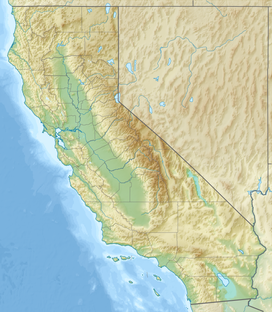Mammoth Mountain
| Mammoth Mountain | |
|---|---|

Mammoth Mountain from U.S. Route 395
|
|
| Highest point | |
| Elevation | 11,059 ft (3,371 m) NAVD 88 |
| Prominence | 1,647 ft (502 m) |
| Coordinates | 37°37′50″N 119°01′57″W / 37.630626492°N 119.032625631°WCoordinates: 37°37′50″N 119°01′57″W / 37.630626492°N 119.032625631°W |
| Geography | |
|
|
|
| Parent range | Sierra Nevada |
| Topo map | USGS Mammoth Mountain |
| Geology | |
| Age of rock | About 50,000 to 200,000 years |
| Mountain type | Lava dome complex |
| Last eruption | 1260 ± 40 years |
| Climbing | |
| Easiest route | Gondola |
Mammoth Mountain is a lava dome complex west of the town of Mammoth Lakes, California, in the Inyo National Forest of Madera and Mono Counties. It is home to a large ski area on the Mono County side.
Mammoth Mountain was formed in a series of eruptions that ended 57,000 years ago. However, Mammoth still produces hazardous volcanic gases that kill trees and caused ski patroller fatalities in 2006.
Mammoth Mountain is a lava dome complex in Mono County, California. It lies in the southwestern corner of the Long Valley Caldera and consists of about 12 rhyodacite and dacite overlapping domes. These domes formed in a long series of eruptions from 110,000 to 57,000 years ago, building a volcano that reaches 11,059 feet (3,371 m) in elevation. During this time, massive dacite eruptions occurred roughly every 5000 years. The volcano is still active with minor eruptions, the largest of which was a minor phreatic (steam) eruption 700 years ago.
Mammoth Mountain also lies on the south end of the Mono-Inyo chain of volcanic craters. The magma source for Mammoth Mountain is distinct from those of both the Long Valley Caldera and the Inyo Craters. Mammoth Mountain is composed primarily of dacite and rhyolite, part of which has been altered by hydrothermal activity from fumaroles (steam vents).
Mammoth Mountain from the north (Minaret Summit)
...
Wikipedia


